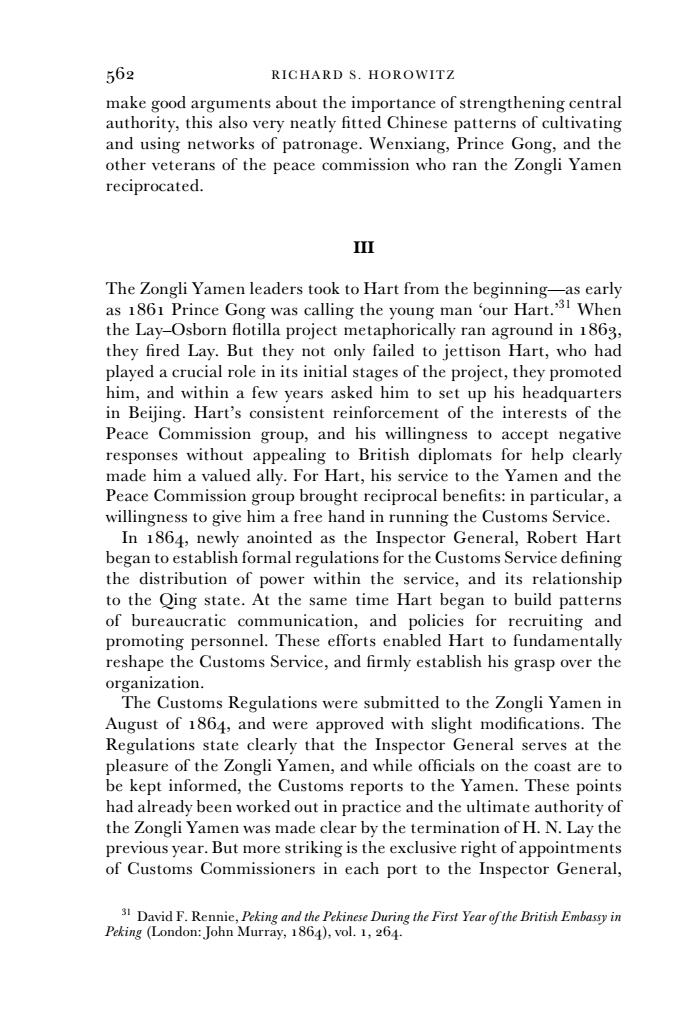正在加载图片...

562 RICHARD S.HOROWITZ make good arguments about the importance of strengthening central authority,this also very neatly fitted Chinese patterns of cultivating and using networks of patronage.Wenxiang,Prince Gong,and the other veterans of the peace commission who ran the Zongli Yamen reciprocated. III The Zongli Yamen leaders took to Hart from the beginning-as early as 1861 Prince Gong was calling the young man 'our Hart.31 When the Lay-Osborn flotilla project metaphorically ran aground in 1863, they fired Lay.But they not only failed to jettison Hart,who had played a crucial role in its initial stages of the project,they promoted him,and within a few years asked him to set up his headquarters in Beijing.Hart's consistent reinforcement of the interests of the Peace Commission group,and his willingness to accept negative responses without appealing to British diplomats for help clearly made him a valued ally.For Hart,his service to the Yamen and the Peace Commission group brought reciprocal benefits:in particular,a willingness to give him a free hand in running the Customs Service. In 1864,newly anointed as the Inspector General,Robert Hart began to establish formal regulations for the Customs Service defining the distribution of power within the service,and its relationship to the Qing state.At the same time Hart began to build patterns of bureaucratic communication,and policies for recruiting and promoting personnel.These efforts enabled Hart to fundamentally reshape the Customs Service,and firmly establish his grasp over the organization. The Customs Regulations were submitted to the Zongli Yamen in August of 1864,and were approved with slight modifications.The Regulations state clearly that the Inspector General serves at the pleasure of the Zongli Yamen,and while officials on the coast are to be kept informed,the Customs reports to the Yamen.These points had already been worked out in practice and the ultimate authority of the Zongli Yamen was made clear by the termination of H.N.Lay the previous year.But more striking is the exclusive right of appointments of Customs Commissioners in each port to the Inspector General, 31David F.Rennie,Peking and the Pekinese During the First Year ofthe British Embassy in Peking (London:John Murray,1864),vol.1,264.562 RICHARD S. HOROWITZ make good arguments about the importance of strengthening central authority, this also very neatly fitted Chinese patterns of cultivating and using networks of patronage. Wenxiang, Prince Gong, and the other veterans of the peace commission who ran the Zongli Yamen reciprocated. III The Zongli Yamen leaders took to Hart from the beginning—as early as 1861 Prince Gong was calling the young man ‘our Hart.’31 When the Lay–Osborn flotilla project metaphorically ran aground in 1863, they fired Lay. But they not only failed to jettison Hart, who had played a crucial role in its initial stages of the project, they promoted him, and within a few years asked him to set up his headquarters in Beijing. Hart’s consistent reinforcement of the interests of the Peace Commission group, and his willingness to accept negative responses without appealing to British diplomats for help clearly made him a valued ally. For Hart, his service to the Yamen and the Peace Commission group brought reciprocal benefits: in particular, a willingness to give him a free hand in running the Customs Service. In 1864, newly anointed as the Inspector General, Robert Hart began to establish formal regulations for the Customs Service defining the distribution of power within the service, and its relationship to the Qing state. At the same time Hart began to build patterns of bureaucratic communication, and policies for recruiting and promoting personnel. These efforts enabled Hart to fundamentally reshape the Customs Service, and firmly establish his grasp over the organization. The Customs Regulations were submitted to the Zongli Yamen in August of 1864, and were approved with slight modifications. The Regulations state clearly that the Inspector General serves at the pleasure of the Zongli Yamen, and while officials on the coast are to be kept informed, the Customs reports to the Yamen. These points had already been worked out in practice and the ultimate authority of the Zongli Yamen was made clear by the termination of H. N. Lay the previous year. But more striking is the exclusive right of appointments of Customs Commissioners in each port to the Inspector General, 31 David F. Rennie, Peking and the Pekinese During the First Year of the British Embassy in Peking (London: John Murray, 1864), vol. 1, 264